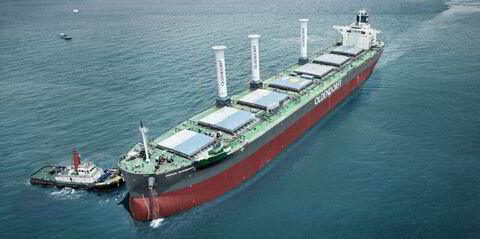Greece’s government has asked the European Union to make charterers liable for carbon prices when the 27-country block includes shipping in its Emissions Trading System (ETS) later this year.
The “polluter pays” principle should apply, Greek shipping minister Yiannis Plakiotakis said in a letter sent to the European Commission, the EU executive organ that will work out the details of shipping’s planned inclusion later this year.
Greece’s proposal to make ships’ commercial operators pay for carbon emission rights is in line with the position taken by the Union of Greek Shipowners (UGS).
The reasoning behind the argument is that shipowners’ customers ultimately decide at what speeds vessel sail and therefore how much carbon they emit.
Incentive for ship improvements
But the position is opposed by other powerful shipping interests, mainly liner operators, which argue that shipowners should be responsible for emissions because they would otherwise have no incentive to adopt new technologies and improve their ships.
Another Greek proposal is for the EU to put a price on carbon outside the framework of the ETS, which “has been designed for other industries”, according to Plakiotakis' letter.
Proceeds from carbon emission rights should be paid into a separate fund instead. This would ensure stable carbon prices and allow proceeds to be reinvested into research for green bunkers, the Greek government suggested.
This proposal reflects the stance taken by the UGS and other European shipowners’ associations, which worry that carbon emission rights within the ETS could be subject to extreme fluctuation and manipulation.
“Our proposal ensures that the EU’s environmental targets are achieved … without putting at risk the thousands of small and medium enterprises that form the backbone of European shipping,” Plakiotakis said.
Greece has been an EU member for 40 years and Greeks own more than half of Europe’s commercial fleet. Following Brexit, the Greek-owned fleet accounts for 58% of the European one, Plakiotakis said.
The government in Athens, however, has only limited influence in EU decision-making, where Greece is easily outvoted by bigger member states such as France, Germany, Italy and Spain.
The EC is expected to unveil its proposals on how shipping should be included in the ETS in July. These proposals are then to be amended and signed off by the European Parliament and the European Council, in which EU member states’ ministers meet.
Several key parameters of shipping’s inclusion in the ETS are still open for debate. A major topic is the measure's geographical scope — whether it should apply only to voyages between European ports or be expanded to include those between Europe and other parts of the world.




